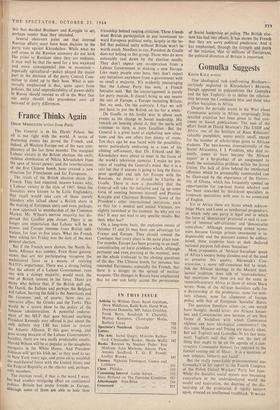France Thinks Again
DREW MIDDLETON writes from Paris: The General is in his Elysee Palace, but all is -not right with the world. A series of shattering events has jarred the French, and, indeed, all Western Europe out of the easy corn- Placency of the last three months. The marginal Labour victory in the British election, the swift, ruthless elimination of Nikita Khrushchev from the apex of Soviet power, and the reverberations of the first Chinese bomb, have created a new situation for Frenchmen and for Europeans.
The result of the British election shook the French. They had expected, heaven knows why, a Labour victory in the style of 1945. Since the Socialists were known to be Little Englanders, that result would take care of those unruly islanders who talked about a British share in the making of European unity and even, perhaps, a new approach to membership of the Common Market. Mr. Wilson's narrow majority has 'dis- persed this Gaullist .pipe dream. There is no longer any expectation that Labour ■,'ill be in Power, and Europe immune from British infil- tration, for four or five years. What the French Were asking last Friday was the date of the next general election.
But if the French were shaken, the North 'At- lantic Alliance was sombre. Even those govern- ments that are not participating recognise the multilateral force as a means of reviving NATO's importance. There was a strong feeling that the advent of a Labour Government, even one with a skimpy majority, would mark the end of British interest in the force. There are many who believe that, if the British pull out, the Dutch, the Italians and perhaps the Belgians Will follow, leaving the field to the Americans and the Germans 'and, of course, those two co- operative allies, the Greeks and the Turks. This would be a severe blow to the policy of the Johnson administration. A powerful endorse- ment of the MLF that goes beyond anything President Kennedy ever offered is just about the only definite step LBJ has taken to restore the Atlantic Alliance. If this goes wrong, and goes wrong because of the Labour Government's hostility, there are two easily predictable results. Harold Wilson will be as popular as the anopheles mosquito in the White House. And President Johnson will 'get his Irish up,' as they used to say in New York years ago, and press on to establish the multilateral force with the United States and the Federal Republic as the charter and, perhaps, only members.
The election result, if that is the word I want, has had another intriguing effect on continental Politics. Britain has many friends -in Europe, although some of them are able to hide their friendship behind rasping criticism. These friends want British participation in any movement to- ward European political unity, largely in the be- lief that political unity without Britain' won't be worth much. Needless to say, President de Gaulle does not belong to this group. Those who do were noticeably cast down by the election results. They don't expect any co-operation from a Labour Government in making a new Europe. Like many people over here, they don't expect any initiatives anywhere from a government with so small a majority. 'It's evidently encouraging that the Labour Party has won,' a French Socialist said. 'But the encouragement is purely for party morale. It doesn't bring us any nearer the sort of Europe, a Europe including Britain, that we seek. On the contrary. I fear we will just have to put the British on ice for a while.'
De Gaulle in his lordly 'way is above such events as the change in Soviet leadership. His remark on hearing about it, that the earth will continue to turn, is pure Gaullism. But the General is a great hand at exploiting new situa- tions and this one offers him plenty of room. Ten days ago he was faced with the possibility, never particularly endearing to a man of his abiding self-esteem, that Dr. Erhard and Mr. Khrushchev were about to meet in the focus of the world's television cameras. I make no pre- tence of reading the General's mind. But it is a safe bet that if anyone is going to hog the Euro- pean spotlight and talk for Europe with the Russians, he thinks it should be Charles de Gaulle. There is now a possibility that the General will take the initiative and rig up some form of meeting between himself and Premier Kosygin and Chairman Brezhnev, Some of the President's other international initiatives, such as that for a neutral and united Vietnam, are slightly tarnished at the moment. So why not try this? It may not lead to any specific results. But then, what has?
On a long-term basis, the explosive events of October 15 and 16 may have one advantage for France and Europe. They should remind the Continent that every place is the same place now. For months, Europe has been growing in on itself, concentrating on-local problems which, although pertinent and even pressing at the moment, were on the whole irrelevant to the abiding questions of the day. The Chinese bomb, for instance, has reminded Europeans, especially the French, that there is a danger in the spread of nuclear weapons. The changes in Russia have emphasised that no one can lazily accept the permanence of Soviet leadership or policy. The British elec- tion has had two effects. It has shown the French that they are sorry political predictors. And it has emphasised, through the strength and depth of the reaction, that to millions of Europeans, the political direction of Britain is important.


































 Previous page
Previous page